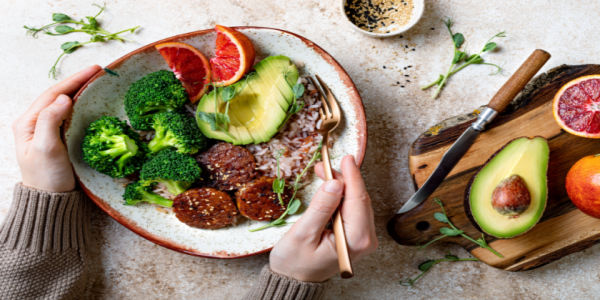
Best Fitness Foods for Women
1. Coffee
Acting as a natural stimulant, the caffeine in coffee can help you defeat that workout! As a few pro tips:
1. Use milk to supply energizing carbs and muscle-stimulating protein.
2. Sip on coffee at least at least 30 minutes to an hour before working out to lessen the risk of an urgent bathroom run, especially if heading to gym in the wee morning hours.
3. Reap the most benefits of coffee by avoiding or reducing adding sugar, syrup, and cream.
2. Oats
The small but mighty whole grain is one of the best food fitness foods, as it supplies steady dose of glucose to energize your workouts, ample fiber for weight management, iron to keep blood rich in oxygen and transported to the body's tissues, and B vitamins to support a healthy metabolism.
Approximately an hour or two before exercise, consume a serving of oatmeal to supply adequate energy whilst allowing it to digest prior. Making these overnight oat recipes is also time-saving method to fuel up your morning workout!
3. Greek Yogurt
Greek yogurt supplies a healthy boost of protein, along with bone-strengthening calcium and gut-supporting probiotics.
But rather than consuming the large loads of added sugars most yogurts come with, opt for plain Greek yogurt and add natural sweetness and fiber with favorite fruits, including berries and bananas.
4. Raspberries
Speaking of berries… Raspberries and other varieties are packed with antioxidants, plant compounds that protect the muscles and body against cellular damage following rigorous and strenuous exercise.
They are also rich in natural sugar and fiber, supplying eight grams of fiber per one cup!
Top a ½ cup of raspberries onto Greek yogurt for the ultimate post-recovery snack.
5. Bananas
Bananas pack energizing carbs to fuel workouts and are rich potassium suppliers. Along with its notorious role in reducing blood pressure, potassium protects muscles against weakness, cramps, and aches to ensure proper recovery and replenishes electrolytes lost in sweat.
For a pre-workout snack, smear a banana with a tablespoon of peanut butter or top onto some oats or yogurt as previously mentioned. This bistroMD high-protein smoothie is also a great way to recover after a workout! Not only does it recover essentials, including protein and potassium, but is chocolately, creamy, and delicious!
6. Oranges
One medium orange supplies women almost their entire daily daily vitamin C needs, a vitamin that plays a large role in skin health related to its antioxidant and collagen-building properties.
Collagen is a protein that helps maintain the structure of bone, tendon, skin, cartilage and all other connective tissue. Several studies conclude a high intake of vitamin C contributes to better skin appearance and decreases in skin wrinkling.
7. Tart Cherry Juice
Consuming tart cherry juice has shown to help athletes recover, particularly by reducing oxidative stress from exercise and speeding up muscle recovery.
Though the juice should not displace a proper post-workout meal or snack, nutrition experts suggest 10 ounces of tart cherry juice pre-workout and an additional 10 ounces within 30 minutes' post-workout shows to be advantageous.
8. Greek Yogurt
Going Greek with your yogurt supplies a healthy boost of protein, along with calcium. Supplying healthy probiotics and protein, going Greek with yogurt is highly advantageous. From muscle growth to digestive and bone support, Greek yogurt is one of the healthiest foods to include in your diet!
But rather than consuming the large loads of added sugars most yogurts come with, opt for plain Greek yogurt and add natural sweetness and fiber with favorite fruits, including berries packed with antioxidants.
9. Salmon
Salmon is loaded with protein, potassium, selenium, and omega-3 fatty acids. Along with its heart-healthy properties, omega-3s help to reduce exercise-induced inflammation and influence muscle metabolism.
Women are encouraged to consume at least two servings of fish weekly, including this blackened salmon recipe for an excellent post-workout meal!
10. Olive Oil
Thanks to its healthy monounsaturated fat content, olive oil supports hormone regulation, prevents muscle degradation, and maximizes muscle creation.
Olive oil is also rich in vitamin E, a powerful antioxidant that signals cell recovery, strengthens the immune system, and supports healthy skin.
Drizzle olive oil onto salads, over cooked veggies, and into soups or use it as a marinade or sauce for fish and poultry.
11. Eggs
Eggs are one power-packed fitness food, even proving to be the cheapest protein source money can buy!
The inclusion of the egg yolk has also proved to be beneficial. In fact, researchers at the University of Illinois found eating three whole eggs, after resistance exercise boosted muscle building and repair 40 percent greater than eating solely just the egg whites with an equal amount of protein!
Aside from their protein content, eggs supply omega-3 fatty acids, phosphorus, iron, and vitamins A, D, E, and K that are beneficial in aiding muscle synthesis and overall health.
12. Chicken
Chicken is a staple amongst all “fit girl diets,” as the lean meat packs on the protein while remaining modest in calories. The lean meat is also a good source of selenium, phosphorus, and B vitamins, all of which support cell repair and a healthy metabolism.
Dark cuts of chicken are also valuable for supporting women's health, as they offer greater iron, zinc, riboflavin, niacin, thiamin, vitamins B6 and B12 compared to white meat.
13. Beans
Whether white, red, black, pink, lima, kidney, or pinto, beans are a generous source plant-based protein, fiber, potassium, folate, and iron.
Add beans to salads, soups, chilis, and casseroles, along with savoring up your protein repertoire with this black bean omelet recipe and blackened tilapia with red beans and rice recipe.
14. Chocolate Milk
Calling all chocolate lovers… One of the best fitness foods is not only budget-friendly and muscle-building, but is luscious and chocolately!
Beyond its flavor, what makes chocolate milk so great? A glass of a 4:1 carbohydrate:protein ratio and provides fluids and sodium to aid in post-workout recovery and refuel fatigued muscles.
A study published in Medicine and Sport Science supports the idea, even showing consuming chocolate milk immediately after exercise and again two hours post-exercise appears to be optimal for exercise recovery and may lessen the risk of muscle damage.
15. Water
Maintaining and achieving adequate hydration is key for fitness and overall health, as water transports nutrients to muscle cells and increases new muscle tissue. Conversely, dehydration can also impair performance and cause muscles to cramp.
(And who wants that?)
Regular exercisers and athletes should drink 16 ounces of water leading up to activity, six to 12 ounces immediately prior to exercise, and every 15 to 20 minutes of active training. Women also need an upwards of about 12 cups of fluid per day, particularly in the form of water or other unsweetened beverages (with the exception of chocolate milk)!







